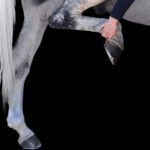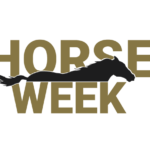West Orange, N.J., June 25, 2010 — Since the dreadful day last winter when she suffered a near-fatal fall, Olympic dressage rider Courtney King-Dye has made enormous strides in recovery.

The training accident on March 3 that left her in a weeks-long coma changed her life, but it didn’t change her characteristic determination, and most importantly, it didn’t change her nature.
“I’m still the same person,” she insisted, as we chatted in her room at the Kessler Institute for Rehabilitation, her home for the last three months. The walls here are covered with cards and notes of encouragement, a constant source of inspiration, as is the picture of herself on her 2008 Olympic mount, Mythilus, that hangs above her bed.
The Courtney who has been living here may be spending time in a wheelchair and working to regain total fluency in her speech, but there is no mistaking her dedication and work ethic. They are the qualities that brought her to the top of her game when she was riding.
In her first interview since the accident, I asked her if she felt like a different person with all she had been through. She quickly assured me that the essential Courtney remains the essential Courtney.
“Maybe I have a different perspective, but…..I have the same sense of humor, same memories and everything,” she said forcefully.
Her devoted husband, Jason, observed, “What’s amazed me is the positive attitude that she’s had. There hasn’t been a negative moment or a negative thought.”
Courtney is healing. There’s a sparkle in her eyes, and when she flashed a smile, I saw the same woman whose photo I had taken so many times as she beamed with delight during awards ceremonies.
She proudly told me she finally had finished reading the hundreds of emails she received, even though working left-handed on the computer isn’t easy.

Now she’s ready for another step. Today, she and Jason, who has been with her every night, are moving into a residential hotel (he has to be glad he won’t be sleeping on the pullout chair bed anymore!) She is going to return to Kessler as an out-patient, but will be able to go home or travel on weekends. The Dyes are headed to the Adirondacks, where they were married, and next month they fly to Michigan, where they will attend bachelor and bachelorette parties in preparation for the marriage of Courtney’s brother.
The ambitious schedule demonstrates that nothing can keep Courtney down. But her plans go much further than weekend jaunts. She wants to ride again internationally, even though her doctors have told her that if her head is injured in another fall, it will be five times as hard to make a comeback. Courtney, true to form, is not deterred.
“My love is riding and training the horses,” she said simply. “When I am ready to ride, then I will help my students ride.” With the positive attitude that has brought her so far, Courtney does not doubt that someday she is going to be doing what she used to do.
Will it happen? She believes it implicitly, but at this point there is no way of knowing that, nor how much longer she must undergo intensive therapy. It covers everything from her speech, to walking and cooking, otherwise known as occupational therapy, important in her efforts to regain full use of her right side.
Fellow rider Lauren Sammis visited her twice over the course of three weeks, and was astounded at her “amazing progress” over that time.
“She’s made such huge strides,” agreed her mentor, Lendon Gray, who was by her side constantly after the accident and still makes a point of visiting once a week.
Not very far down the road, it is certain that Courtney will be back with horses, though they won’t yet be her horses. She plans on doing hippotherapy that she expects will reawaken her muscle memory from the days when she emerged as one of the country’s most recognized and admired athletes in her sport.
That athleticism, her fitness and the discipline stemming from years of training have boosted her from the devastation of a skull fracture and brain trauma to being a functioning human being on the way to recovery.
Courtney was injured when a young horse she was training in Loxahatchee, Fla., fell with her on March 3. She wasn’t wearing a helmet, and still doesn’t know why, noting that she generally strapped one on when she was riding a young horse.
It was the ultimate insult over the course of a difficult 18 months for Courtney. Mythilus, her Olympic mount, was disqualified from the Games due to a positive test for a prohibited substance. No one could ever figure out how the substance, which showed up as a tiny trace, got into his system.
A year later, he was gone, as complications from a colic surgery ended his life. Ten days after that, Courtney’s promising mount, Rendezvous 3, broke her pastern in a pasture accident and had to be put down.

During the time she was in a coma, when she had what she called “funny dreams,” Courtney saw Myth and Rendezvous playing together in a field. When she emerged from the coma, she thought both horses were alive. Then she had to go through the pain all over again when she was told they were gone.
Courtney spoke wistfully about Myth, saying how much she misses him, “because of his heart, he always tried, even though he was very hard to ride. He was so honest and so good,” she sighed.
If there is any silver lining to Courtney’s accident, it has been an emphatic warning for dressage riders, many of whom trained in baseball caps and then switched to top hats for upper-level competitions, eschewing the protection afforded by a helmet. While helmets are mandatory for hunter/jumper riders at shows, dressage riders often felt that since they aren’t jumping, they don’t need protective headgear.
“You can’t train a horse not to fall down, no matter how good you are,” Courtney pointed out.
In the wake of her mishap, more and more dressage riders are wearing helmets, even in top-level competition. The riders4helmets organization, inspired by her misfortune, is a proactive force to spread the word about safety and encourage it. The group is sponsoring National Helmet Awareness Day on July 10.
Safety initiatives also have had a fundraising component to help with Courtney’s medical expenses. She and her husband have been awed and grateful for all the support she has received.
“I really appreciate all the care and love, monetary as well as emotional,” she said as her eyes swept over the cheery and heartfelt greetings on display all around her.

Her family and Lendon have given her strength, and she feels closer than ever to her loved ones as a result. Their help has been an essential component of her continuing recovery.
It also has been fueled by dreams and goals, important components of her past success, and she is counting on being able to realize them again.
“I don’t know how long it takes, but I will get there,” she promised me before we parted.
“I want to make the 2012 Olympics. I will work hard. If it doesn’t happen, I can’t blame it on not working hard. It’s all I can do.”
Award-winning equestrian journalist Nancy Jaffer has covered eight Olympic Games, all five World Equestrian Games and numerous other major international equestrian events.





